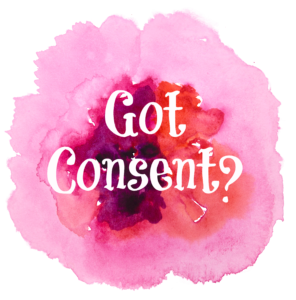- Home
- personal sexuality
Shame, Sexuality and Living Through Spirals
Shame is such a stumbling block when it comes to figuring out and living joyfully in your sexuality – and so many of us are swimming in it. Religions that left us thinking our desires, and by extension ourselves are sinful, violence and trauma that has been done to us that leaves us feeling broken, dirty or wrong, painfully narrow constructions of what attractiveness can be. None of us grew up in a society that really wants us to be happy with ourselves just as we are.
That’s what shame is about – a seed of doubt existing in the deepest darkest places of ourselves, that somehow we’re wrong on some core level and can never change that. Often this message of our inherent wrongness is paired with a message of how we can be right – by massing wealth or status; by spending hours on exercise and diet to hit certain (racist, ableist, transphobic, and fatphoic) markers of attractiveness; by confessing our brokenness and promising to follow arbitrary rules. All in the name of being worthy.
Here is a Truth: there is no correlation between our worthiness-as-people and our achievements. But for those of us who struggle with shame, this is a hard truth to hold onto.
And yes, I say this as someone who is in this struggle too. I’ve been doing shame reduction on a personal level work for years now. I’ve got my bopo role models to help inspire me, my somatic practices to keep me in this body, and my dating rules that limit my exposure to fuckery, and it still, STILL, creeps in. Every now and then I lose my ability to see the innate goodness of myself. It starts by thinking the body I’m bringing to the table isn’t desirable enough. Then it recalls the ghosts of middle school, of schoolyard cruelty and boys who thought offering affectionate connection was a hilarious game. At the peak of a shame spiral, I lose the ability interpret information from anyone around me. Is that person looking at me because they think like what they see, or are they fixated in disgust?
In these worst moments, I feel alone and lonely – despite often being surrounded by people. In turn, I started to isolate myself. I reach out less, can’t bring myself to set plans with anyone and I check out of any potential relationship connections. That’s what shame does – it disconnects us. It’s a liar that says we’re alone in this and are going to be alone in this forever. Shame’s a jerk if you’re already in a relationship and an absolute asshole if you’re a solo unit.
Now, as I mentioned, I’ve been working on digging into my shame for years now, so these bouts of shame don’t stick around too long. I’ve learned when to push myself even though I don’t feel like it, and how to remind myself that my body is a good body, and how to limited attention seeking behaviour that tries to gain external validation. For me, the goal is to be shame-less, and when I scale back to look over the years I can see that I’m moving towards that goal. It’s been key work in stepping into a sexuality that I can honestly say I love and find sustaining. And I never could have done it alone. I still can’t do it alone – I rely on the care and connection I have in my life to help in the moments when it’s too overwhelming.
Working with someone to explore how shame impacts your sexuality gives you a safer space to dig into The Things You Believe To Be True about yourself, your worth, your desirability. Someone with a bit of space and can help you evaluate if that story is realistic or being influenced by shame. Together, you can create an action plan to dig yourself out of a shame spiral, or for the times you can’t, a plan to ride the waves of emotion.
Finding relationships is enough work without also trying to fight past shame. Get someone on your team – it’s absolutely worth it.
Enthusiastic Consent on a Personal Level
 There’s an article making the rounds right now about how one sex party host has built a culture of consent at their party through a series of rules and agreements. And I’m very sorry to say it’s an article I’m not a huge fan of. Sorry because as much as I appreciate the conversation and think clear rules of active consent are useful for sex parties, I don’t think we can simply apply those rules to a more daily experience of sex and be done with it. And no, 60 person orgies are not a daily experience for sex for your average person.
There’s an article making the rounds right now about how one sex party host has built a culture of consent at their party through a series of rules and agreements. And I’m very sorry to say it’s an article I’m not a huge fan of. Sorry because as much as I appreciate the conversation and think clear rules of active consent are useful for sex parties, I don’t think we can simply apply those rules to a more daily experience of sex and be done with it. And no, 60 person orgies are not a daily experience for sex for your average person.
Here’s my biggest beef:
Consent is binary. You have enthusiastic consent or you do not have consent.
While I think enthusiastic, clear, (and I would add verbal) consent is important in scenario’s of high sexuality (like orgies, weekend cons, kink spaces, etc) I’m not sure this conversation is overall helpful to how most people struggle with consent in their daily lives or wrestle with self-coercion in their person sexuality.
So I’ve been complaining, a bit, on twitter.
Real life isn’t sex parties. Relatioships aren’t sex parties. Struggling w/personal sexuality isn’t sex parties. Life’s complex. Embrace it.
— Heather (@MissHC) August 15, 2016
But I want to be clear that I don’t think enthusiastic consent is useless; I’m just unconvinced that it’s the most useful measure of consent, especially when it comes to real-world relationships. The kind most of us are having. Outside of sex-focused spaces.
Here’s a great way to use enthaustic consent in a real world way: If I could be having any type of sex with any type of person, what sex would be AMAZING right now?
Pondering this question when you’re not in the middle of a sexual scenario helps to you to start to recognize sex that you’re probably going to be interested in, or gives you a scenario to play out next time you want to want sex with your lover, but aren’t just there yet.
Predicting sex on desire can be a great measure of consensuality, but it’s not the only measure and not being super jazzed to have sex right now doesn’t mean that sex should be inaccessible. It just means that we need to be upfront and honest about where we’re at and how we want to navigate what consent looks like (and by that I mean, how to be sure you’ve got consent – let me be super clear that we’re talking present plus – when consent doesn’t match your understanding of enthaustic.).

